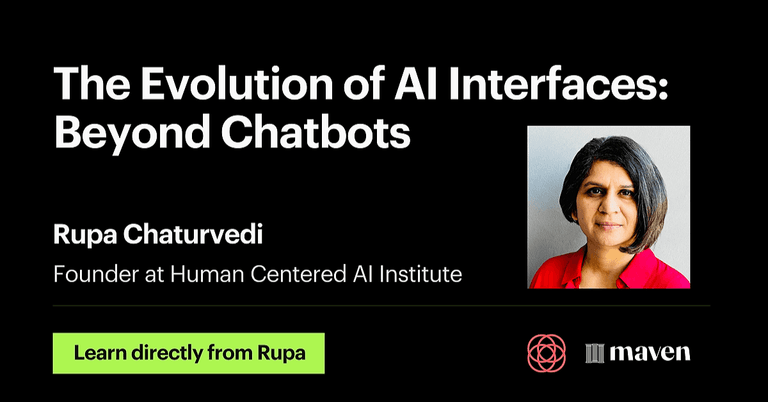Advanced AI & Agentic Design
Rupa Chaturvedi
AI Design Leader | x-Uber/Google/Amazon

The AI Tech Revolution Is Redefining Design
AI is fundamentally changing how software products are being built. Companies are integrating large language models, agents, and adaptive systems. But user experience is often an after thought.
The challenge? Designing for AI isn't like designing for traditional software. It's about system behavior, adaptation, and collaboration between humans and machines.
If you've launched an AI feature only to watch users abandon it because they didn't understand what it was doing, or if you've been asked to "design the AI experience" but weren't sure where to begin, this course is for you.
The Designer's Role Is Evolving
OpenAI and Zillow recently posted Model Designer roles focused on shaping how models behave. AI design roles are becoming mainstream, and designers are increasingly being pulled into agentic workflows. This signals where the discipline is headed: designers who can work upstream, influencing what systems learn, how agents act, and when they surface decisions to users.
The discipline is shifting upstream. Designers must now shape what systems learn, how agents behave, and when to include humans in the loop - not just style the interface.
What you’ll learn
Go beyond interfaces—shape how intelligent systems behave.
Learn how LLMs, multimodal models, and fine-tuned systems differ in capability and how these differences shape user experience design.
Understand model architecture tradeoffs and their implications for relevance, accuracy, and interface design decisions.
efine quality standards for AI outputs based on user needs and communicate these requirements effectively to technical teams.
Evaluate model performance beyond accuracy metrics using frameworks that assess UX impact and user trust.
Work with systems that learn from user input, designing feedback loops that improve model performance without breaking user trust.
Anticipate and design for emergent behaviors that arise as models encounter edge cases and evolving user patterns.
Design experiences that surface model reasoning, explanations, and confidence levels so users understand AI decisions.
Create human-in-the-loop patterns that maintain user agency and enable intervention when AI makes high-stakes decisions.
Create patterns for agents that act autonomously across tasks while balancing proactive assistance with user control.
Design decision points where agents escalate to users and how to communicate agent progress across multi-step workflows.
Participate in model selection and agent architecture discussions using frameworks that connect technical choices to UX impact.
Position your design expertise strategically in product decisions before implementation, shaping what gets built, not just how it looks.
Learn directly from Rupa

Rupa Chaturvedi
AI Design Leader | AI enablement for UX orgs | ex-Uber, Google, Amazon, Stanford
Who this course is for
Senior UX & Product Designers: Deepen your systems thinking skills and learn to design around model behavior
Design Leads & Heads of UX: Guide teams, shape AI product strategy, and lead with system-level thinking and trust design.
AI-Aware PMs & Researchers: Collaborate better with design, align model goals with UX, and support trust focused, adaptive systems.
What's included

Live sessions
Learn directly from Rupa Chaturvedi in a real-time, interactive format.
Lifetime access
Go back to course content and recordings whenever you need to.
Community of peers
Stay accountable and share insights with like-minded professionals.
Certificate of completion
Share your new skills with your employer or on LinkedIn.
Maven Guarantee
This course is backed by the Maven Guarantee. Students are eligible for a full refund through the second week of the course.
Free resource

The Evolution of AI Interfaces: Beyond Chatbots
Explore the Evolution of AI Interfaces
Learn how AI interfaces have evolved from simple chatbots to complex, multi-modal systems across platforms.
Identify Key Trends Shaping AI Interface Development
Discover emerging trends in AI interfaces, from voice assistants to autonomous systems, and how to design for them
Learn Practical Design Strategies for AI Systems
Gain actionable strategies for integrating evolving AI interfaces into your product development process
Schedule
Live sessions
2-4 hrs / week
Projects
1-3 hrs / week
Async content
1-3 hrs / week
Frequently asked questions
$3,350
USD